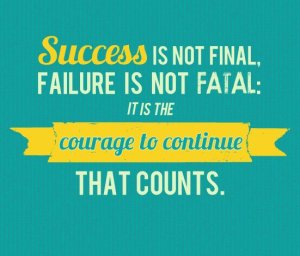 There’s a big misconception when it comes to failure. Ever since we’ve been children, we’ve seen that failing is nothing but a negative experience. Teachers would be disappointed and parents would yell at you for failing a test. If you failed a course, you’d use up your valuable summer time taking make-up courses. There has always been negativity associated with failure.
There’s a big misconception when it comes to failure. Ever since we’ve been children, we’ve seen that failing is nothing but a negative experience. Teachers would be disappointed and parents would yell at you for failing a test. If you failed a course, you’d use up your valuable summer time taking make-up courses. There has always been negativity associated with failure.
Things change once you’re an entrepreneur. By no means am I saying that failure gets easier. It still sucks, and it still stings and lingers with you for quite a while. However, when either your business or your product fails, it doesn’t mean that you should call it quits and give up. Quite the opposite, actually. I’ve touched on this in a few previous blog posts, but I thought it was time to dedicate an entire post on the often not discussed upsides of a failure.
It Makes You Stronger: As I mentioned in my previous post, when an athlete experiences failure, they don’t let it crush them. How many times have you seen a team lose a game, only to have the whole team give up? Obviously they don’t and neither should you. There is no one failure that should completely make you give up entirely. You need to dig deep and find out what you could have done to prevent the failure. If you couldn’t have prevented it, at the very least the experience will make you a better person and teach you about yourself.
It Teaches You Multiple Lessons: Besides teaching you about yourself, you’ll also learn a lot about your business. Specifically, it’ll teach you about the strengths of your team, which is always valuable to know. While you shouldn’t necessarily blame a team member for the failure, you’ll know what areas they can improve on, and where you can mentor them to become better. If the failure revolves around a product launch, you’ll be able to pinpoint what needs to be changed about your product and why the market didn’t latch onto it.
It Makes You Re-Evaluate: Once failure teaches you a lesson, the obvious next step is to re-evaluate. As hard as it might be to accept, perhaps there simply isn’t a market for your product, or perhaps there’s a crucial element that you’ve over looked. This is the time where you make changes to your work formula and make some tough decisions to continue moving forward. This is also the time to listen to any feedback that you’ve received, particularly negative feedback, as this is what will accurately tell you what you need to reconsider.
At the end of the day, don’t let one or even multiple failures stop you. You need to build your own path, and stay strong while you’re on the road to greatness. I’m curious to know what failures you’ve had as entrepreneurs, and what lessons have they taught you?
